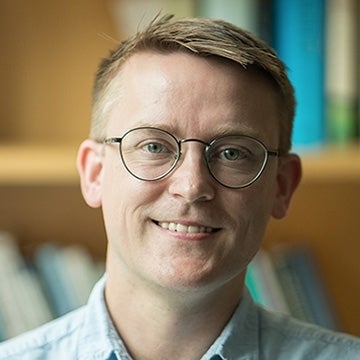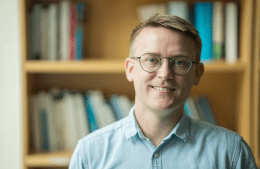
David Lydon-Staley, M.F.A., Ph.D.

- Associate Professor of Communication
- Principal Investigator, Addiction, Health, & Adolescence (AHA!) Lab
David Lydon-Staley’s research focuses on moment-to-moment and day-to-day fluctuations in brain, behavior, and interpersonal and media environments to provide insight into substance use, emotion dynamics, and curiosity across the lifespan.
David Lydon-Staley is an Assistant Professor at the Annenberg School for Communication at the University of Pennsylvania. Lydon-Staley’s research program pursues three main lines of research with media and interpersonal communication at their heart: 1) curiosity across expansive media environments and its relevance for health communication efforts; 2) the role of media engagement and interpersonal communication in emotion dynamics; 3) a dynamic network perspective on substance use. Common to all of his work, is an emphasis on intensively-sampling brain, behavior, and interpersonal and media environments as they unfold during daily life. He makes use of functional Magnetic Resonance Imaging (fMRI), experimental laboratory paradigms, and experience sampling methodologies coupled with intensive-longitudinal data and network analysis techniques.
Lydon-Staley’s work has been funded by the National Institute on Drug Abuse, the Jacobs Foundation, the International Society for the Study of Behavioral Development, the Center for Curiosity, and the Brain & Behavior Research Foundation. He received his bachelor’s degree in Psychology and English Literature from Trinity College Dublin, Ireland and his Ph.D. in Human Development & Family Studies from The Pennsylvania State University. Before joining Annenberg, he completed a postdoctoral fellowship in the Complex Systems Lab of Professor Danielle Bassett in the Department of Bioengineering at the University of Pennsylvania.
Lydon-Staley is also a fiction writer and completed an M.F.A. in Creative Writing at Drexel University in 2025. His short stories have appeared in Cleaver Magazine and Jonathan: A Queer Fiction Journal. His fiction explores queer identity and the quiet, everyday moments that shape relationships. His fiction is represented by Jim McCarthy at Dystel, Goderich, & Bourret, LLC.
Education
-
M.F.A., Drexel University, 2025
- B.A., Trinity College Dublin, 2011
- M.S., The Pennsylvania State University, 2014
- Ph.D., The Pennsylvania State University, 2017
Selected Publications
“Hunters, Busybodies and the Knowledge Network Building Associated With Deprivation Curiosity.” Nature Human Behaviour, 2021.
“Gendered Citation Practices in the Field of Communication.” Annals of the International Communication Association, 2021.
Courses
- COMM 8520 It’s About Time: Problematizing Time in Social Science Research
- COMM 3450 Adolescence and Media
- COMM 8590 Diversity and the End of Average

How Tobacco Retail Exposure Impacts Smoking Behavior
Penn researchers have found that smokers report higher levels of craving and smoked more cigarettes on days when their exposure to tobacco retail is higher.






